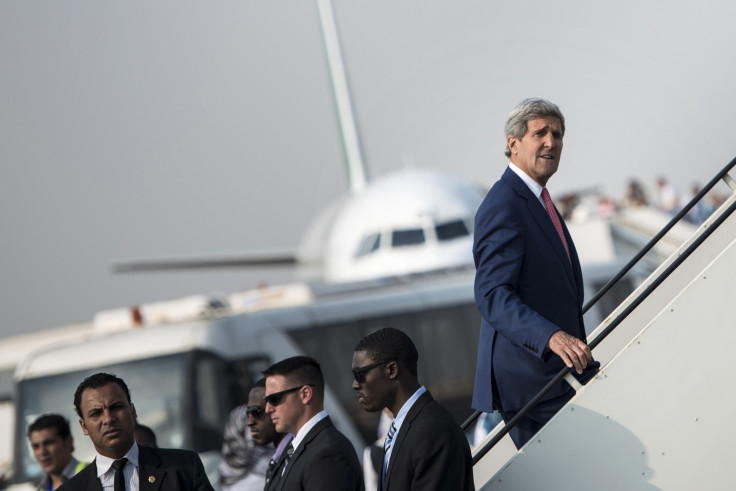Isis Propaganda War on the Front Line of Cyberspace
When the White House finally invoked the word "war" on 12 September to describe the new US-led campaign against Isis in Iraq and Syria, the already ominous parallels between 1914 and 2014 grew more resonant still, with the 21st-century wrinkle of cyber conflict adding a particularly destabilizing factor to today's situation.
Pockmarked by crises - Boko Haram, Gaza, Ukraine and MH17, Ebola, Isis - the unquiet summer just concluded seemed all along to be leading up to something.
In 1914 it took about six weeks after the June assassination in Sarajevo of Archduke Franz Ferdinand for war to erupt between Germany and Austria, the Dual Alliance, and Britain, France, and Russia.
In 2014, similarly, it was only weeks after Isis militants drove hundreds of thousands of Iraqis from their homes in Mosul and Tikrit, and isolated the minority Yasidis on Mount Sinjar, that President Obama announced "we will degrade and ultimately destroy" Isis.[1] (The Isis beheading videos, starting with James Foley's execution posted on the Internet on 19 August, were a political accelerant.)
The danger of another World War I, a violent continent-wide contest for territory and regional influence that leaves mass casualties and redraws maps, is low. Isis will not soon steam into New York Harbor, guns blazing. But, beyond the narrow and classically kinetic "war on Isis" newly defined by the Obama administration, there is a fierce below-radar war in cyberspace for economic and political influence, involving numerous players.

With terrible brilliance, Isis, for one, both commits cyber crime and floats cyber propaganda. It boasts both a "backroom" criminal operation, which raises funds, and a front-of-house "daylight" operation devoted to image building.
A popular Isis app for Android phones, "Dawn of Glad Tidings," is right out of Social Marketing 101: download it and Isis hijacks your Twitter account to reach all your followers, expanding its fan base organically and with head-snapping speed. "Dawn" also gives access to slick, often violent imagery and videos, plus bulletins of ground gains in Iraq and Syria.
The Isis beheadings have become an object of awful fascination for Internet users – eschewed by broadcast news networks but eagerly viewed by millions in cyberspace.
Isis keeps up with the news, including the sports pages. It co-opted World Cup Twitter streams this summer to propagandize unsuspecting football fans in Europe and North America. It pushes hashtags; trending hard on the Twitter leader board this summer was #CalamityWillBefallUS.[2]
What Isis accomplishes in social media counts as a new form of warfare that conquers hearts and minds with no shots fired. It creates impressions of might, sophistication, and inevitability - the same impressions made by the Kaiser's military machine in 1914 as Germany sought to define a Mitteleuropean sphere of influence.

Isis is far from the only adept cyber propagandist. Russia, for its part, has recently begun touting the existence of a hitherto unknown country, Novorossiya, via online propaganda that strokes the Russian expansionist impulse.
Most versions of Novorossiya (its putative borders vary) happen to occupy much Ukrainian territory, but all would be news, and unwelcome news, to Ukrainians. "The Russian Academy of Sciences recently announced it will publish a history of Novorossiya this autumn, presumably tracing its origins back to Catherine the Great," reports Anne Applebaum, Director of the Global Transitions Program at the Legatum Institute in London.[3]
It is no accident that Isis, Vladimir Putin's Russia, and other global aggravations turn with such enthusiasm to cyber tactics. Cheap, disruptive, and easily engineered, cyber weapons are critical to what American commentator David Brooks recently called a "revolt of the weak."
"[T]he underlying frameworks by which nations operate are being threatened in fairly devastating ways. That is to say, there are certain unconscious habits and norms of restraint that undergird civilization. These habits and norms are now being challenged by a coalition of the unsuccessful," says Brooks. "There are certain weak movements and nations, beset by internal contradictions, that can't compete if they play by the normal rules of civilization. Therefore, they are conspiring to blow up the rule book."[4]
There are at least two ironic parallels between the tense, taut, summers of 1914 and 2014, the first obvious, the second less so.
The obvious point is that World War I led, bloodily, to the remapping of the Ottoman Empire by the British and French and the eventual starts of Syria and Iraq, epicenters of today's unrest, plus Lebanon and Kuwait. This was the initially secret Sykes-Picot agreement, a hundred-year source of anger for many in the Middle East. When Isis claims a geographic caliphate, spanning parts of Syria and Iraq, and advances its aims via cyber means, it is an unsubtle stab at the old colonialists.
"It was historically fitting for the propagandists of Isis to mark the hundredth anniversary of Archduke Ferdinand's death by tearing down – or, at least, saying they'd torn down – one of the last vestiges of what became known as the Great War," wrote John Cassidy in The New Yorker.[5]

The second, more subtle irony lies in the relative futility of starting a conventional war to achieve economic advantage, which was what Germany really sought in 1914, and the ways cyber weapons can enable such gains today. In the 21st century wars over territory are comparatively rare, but contests for economic (and, in the cases of Isis and Russia, ideological) supremacy are everywhere. We see them manifested not only in cyber propaganda, but constant assaults on computer networks to steal everything from nuclear codes, to new-car blueprints, to your credit card data.
The brilliant World War I historian Max Hastings, author of Catastrophe 1914 and other works, has said if Germany had kept its military might to itself one hundred years ago, it would soon have won what it wanted by peaceful means:
"The greatest of all ironies of 1914, I should add, is that if Germany had prevented a war and had simply continued the awesome march of its economy and industries, its dominance of Europe within a decade or two would have been irresistible, without a shot being fired. It was the huge folly of the Kaiser and those around him that, like most leaders of their era, they measured strength by counting soldiers... the soaring advance of German manufacturing and trading was a force in world affairs far stronger than any fleet of dreadnoughts.[6]"
In a parallel world where World War I was averted one hundred years ago we would not only have saved millions of lives, but averted the circumstances that led to the troubled creation of Iraq and Syria, hence much of the instability that torments the West today. (Hitler, and by connection World War II, also probably would not have come to pass.)
But we must deal with the world as is, and our world contains deceptively potent threats, only some comprehensible to 1914 eyes. In some ways another World War I-scale conflict is practically unthinkable, but in other ways it is already raging all around us in 2014, with cyber weapons a key factor. The nature of conflict is fundamentally changing, with cyber capabilities a key catalyst.
Today's battles are different. The Isis beheadings are appalling, and widely circulated cyber propaganda in their own right, but we have no event on the scale of a Somme, or Verdun, or Gallipoli, at which to point webcams and galvanize the world – the stakes are as high as a century ago. Nor are we likely to. As David Brooks puts it, "Putin and Isis are not threats to American national security, narrowly defined. They are threats to our civilizational order."[7] It is the key challenge of our time to recognize the essential differences between 1914 and 2014 as well as the parallels, and this time choose and prosecute the worthy, critical fights.

Jarno Limnéll is a professor of Cyber Security in Aalto University and he holds a Doctor of Military Science degree from Finland's National Defense University. He can be followed on Twitter at @JarnoLim.
- [1] Spencer Ackerman, "Seven Key Points From Obama's Isis Speech and What They Actually Mean," UK Telegraph, 11 September. http://www.theguardian.com/world/2014/sep/11/obama-isis-speech-problems-key-points-mean
- [2] Rod Nordland, "Iraq's Sunni Militants Take to Social Media to Advance Their Cause and Intimidate," The New York Times, 28 June 2014.
- [3] Anne Applebaum, "War in Europe is Not a Hysterical Idea," Washington Post, 29 August 2014.
- [4] David Brooks, "The Revolt of the Weak," The New York Times, 1 September 2014.
- [5] John Cassidy, "From Sarajevo to Baghdad: The Lessons of War," The New Yorker, 1 July 2014.
- [6] Cullen Murphy, "Max Hastings on Catastrophe 1914, and Breaking Conceptions of "Blame" Over World War I," Vanity Fair, 4 November 2013: https://www.vanityfair.com/news/daily-news/2013/11/max-hastings-catastrophe-1914
- [7] Brooks, The New York Times, 1 September 2014.
© Copyright IBTimes 2025. All rights reserved.





















